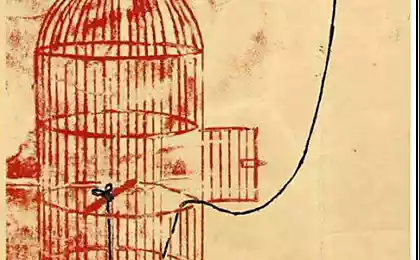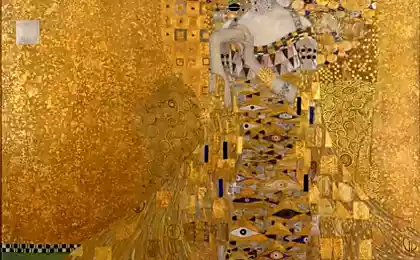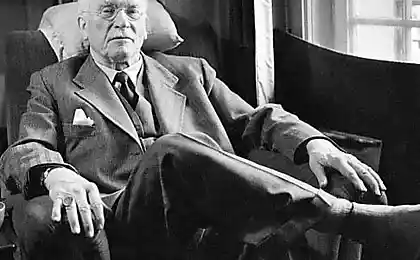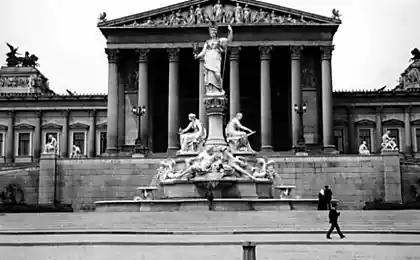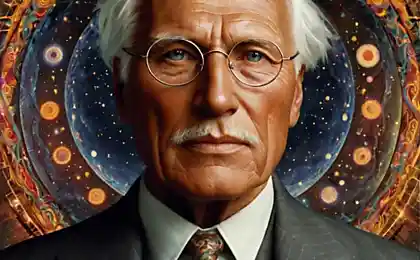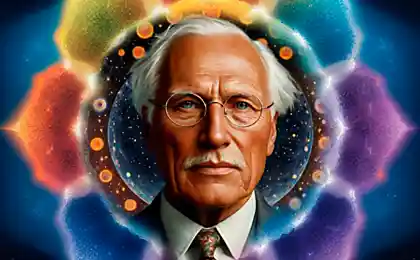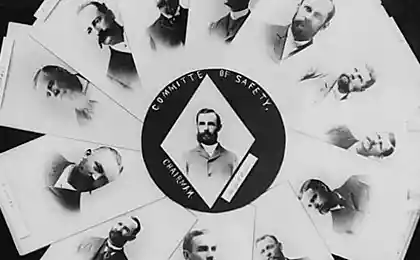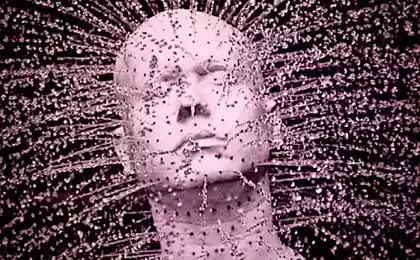687
Carl Gustav Jung: the bigger the crowd, the insignificant individual
As a person turns into a nameless one, why the abstract idea of the state becomes real human life, and that can change such a plight of the individual in the modern world.What is happening now in the world? What is happening in our country? What is happening in the hearts of men? Worth a look once the news to be horrified: the politics of the state, the ignorance of officials, a silent consent of the people (though, as usual: "the people are silent"). We don't like politics, but love to understand the psychology of the masses and to wander the byways of the collective unconscious. Therefore, in order to shed light on the reasons for such madness, we decided to publish a fragment from the book "the Undiscovered self" Carl Gustav Jung (1957).
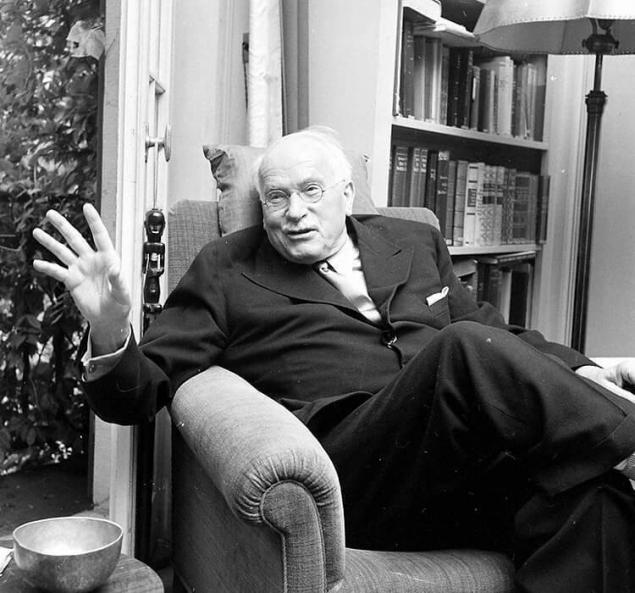
In the Chapter "the plight of the individual in the modern world", the great Swiss psychiatrist trying to understand why the individual loses its characteristics and becomes a victim of egalitarianism, as such abstract concepts as state and society cannot take the place of the individual and subject to his policy, the meaning and purpose of his life, and why the leader generated by an amorphous mass, often turns out to be not the saving person who can clearly and sensibly look at the situation, and those who, being a slave to his own inventions, "inevitably becomes a victim of his own inflated ego-consciousness."
I think that is a good basis for reflection. So read Jung, you learn to think critically, see clearly, to separate from the crowd and state and look for your undiscovered self.
Plight of the individual in the modern world
What will bring the future? From time immemorial this question has occupied man, though not always in equal measure. History shows that people with anxiety and hope turns his eyes to the future during times of physical, political, economic and spiritual upheaval, when comes a lot of expectations, ideas of utopian and apocalyptic visions. Recall, for instance, of the chiliastic expectations of the contemporaries of Augustus, at the dawn of the Christian era or spiritual changes in the West that accompanied the end of the first Millennium after Christ. In our time, when nearing the end of the second Millennium, we again live in a world filled with apocalyptic images of universal destruction. What is the significance of the division of humanity into two camps, which is the symbol of the "Iron Curtain"? What will become of our civilization and the humanity, if you start to explode the hydrogen bomb, or if the spiritual and moral darkness of state absolutism will engulf all of Europe?
We have no reason to believe the possibility of such an outcome is unlikely. In any country of the West there are small groups of subversive elements, which, using our humanity and commitment to justice, keep ready a match in safety fuse, and stop the spread of their ideas can only be a critical reason of the individual, highly developed and mentally stable stratum of the population. One should not overestimate the "thickness" of the layer.
In each country it is different, depending on the national temperament of the population. In addition, the thickness of this layer depends on the level of education in a given country and from extremely strong factors of economic and political nature. If the criterion is to use the plebiscite, according to the most optimistic estimates the thickness of this layer will constitute forty percent of the total electorate. But a more pessimistic assessment is fully justified, as the gift of common sense and critical thinking does not belong to the most characteristic peculiarities of man, and even where it does exist, it is not permanent and immovable, and generally weakens as the growth of the political groups. Weight suppresses the insight and thoughtfulness that is still capable individual, and inevitably leads to doctrinaire and authoritarian tyranny, it is only constitutional for the state to give up the slack.
The use of rational arguments may have chances of success only if the emotionality of a given situation does not exceed a certain critical level. If the intensity of passion rises above the critical level, then disappears every possibility that the word mind will have an effect, and it is substituted slogans and illusory desires, fantasies. That is a kind of collective madness, which quickly turns into a psychic epidemic. In such circumstances, to the top of the rise are those items that during the reign of the mind are considered antisocial and the existence of which society suffers.
Such individuals in any way are not rare and unusual instances, which can be found only in prison or a mental hospital. According to my estimates, for each explicit crazy has at least ten hidden, the madness of which is rarely seen in the open form, looks and behavior, with all the appearance of normality, unbeknownst to their consciousness exposed to the morbid and perverse factors. For obvious reasons, there is no medical statistics of hidden psychosis. But even if their number will be a little less than ten times, exceed the number of real psychopaths and criminals, they are small relative to the total population number of more than kompensiruet extreme danger of these people.
Their mental state akin to the state of the group residing in collective arousal, and is subject to biased estimates and desires-fantasies. When such people are in their environment, they adapt to each other and, consequently, feel at home. From my own experience, they have learned the "language" of such a situation and know how to manage them. Their ideas Chimera, fueled by fanatical resentment, appeal to the collective irrationality and find fruitful soil; they Express all those motives and all the discontent that more normal people are hidden under the cover of prudence and discernment. Therefore, despite their small percentage of the quantity they represent as sources of infection great danger, precisely because so-called normal person has only a limited level of self-knowledge.
Most people confuse "self-knowledge" with knowledge of their conscious ego-personalities. Anyone who has any ego-consciousness, has no doubt that he knows himself. But the ego knows only its own contents, and do not know of the unconscious and its contents. People define their self-knowledge measure knowledge about yourself the average person of their social environment, but not the real psychic facts which are for the most part hidden from them.
In this sense the psyche like the body, about physiology and anatomy which the average person knows too little. Even though the average person lives in the body and with the body, but most of it he is entirely unknown to the public consciousness with what is known about the body, require special scientific knowledge. I'm not talking about that "not aware" of the body, but which, nevertheless, exist.
So what is called "self-knowledge" is very limited knowledge, most of which depends on social factors, from what happens in the human psyche. Therefore, the person always there is a preconception that certain things are not "with us", not "our family" or not with our friends and acquaintances. On the other hand, in humans, there is no less illusory belief about the existence of certain qualities, and this belief only hides the true state of things.
In this broad area of the unconscious, which is protected from criticism and control of consciousness, we are completely defenseless, open to all types of mental influences and psychic infections. As with the dangers of any other type, we can prevent the risk of psychic infection only if we know what will attack us, but also where, when and how an attack may occur. Since self-knowledge is a matter of knowing the specific facts, the theory here is unlikely to help.
For the more a theory claims to its universal validity, the less it is able to serve as a basis for a correct evaluation of the specific facts.
Any based on everyday experience, the theory is necessarily statistical; it displays the ideal average value and rejects all exceptions at both ends of the scale, replacing them with abstract meaning. This theory is quite true, but in life things are not always in accordance with it. Despite this, the abstract meaning theory appears as a fundamental immutable fact. Any exceptions to the extreme, though no less real, the theory is generally not included, because the contradict each other. For example, if I calculate the weight of each pebble on pebble beach and get a average weight of five ounces, this figure will hardly be able to tell me about the real nature of the pebbles. Any who, on the basis of my research will solve what you can first try to pick up a stone weighing five ounces, will face a serious disappointment. In fact, it may be so that after long hours of searching, he did not find pebble weighing exactly five ounces.
The statistical method shows us the facts in the light of the ideal average value, but does not give us a picture of their empirical reality. Despite the fact that the average value, no doubt, reflects a certain aspect of reality, it can be the most insidious way to falsify the truth. This is particularly true for theories based on statistics. Meanwhile, hallmark is his personality. Roughly speaking, the real picture consists only of exceptions to rules and, accordingly, the absolute reality is fully dominated by irregularity.
This should remember every time it comes about that a theory can be a guide on the path of self-discovery. Does not exist and there can be no self-knowledge based on theoretical assumptions, as the object of that knowledge is individual to the relative exclusion and the phenomenon of "wrong." Therefore, the characteristics of the individual are not universal and correct, but rather unique. It should be seen not as a standard unit but as something unique and one of a kind that, in principle, cannot be known until the end and cannot be compared with anything else. At the same time, the person, as a representative of the human race, can and should be described as a statistical unit; otherwise, it is impossible to say nothing. To solve this problem, it should be considered as the unit of comparison. The result is a universally correct anthropology and psychology with an abstract human figure
Under the influence of scientific assumptions, not only the psyche but the individual man, and even individual events are victims of "egalitarianism" and "erasing differences" that distort the picture of reality into a conceptual average. We must not underestimate the psychological effect of the statistical world picture: it rejects the individual, replacing it with faceless units that collects in mass formation. Instead of a particular individual, we have the names of organizations and, as a culmination of an abstract idea of the State as a principle of political reality. This moral responsibility of the individual inevitably is replaced by national interests, raison d'etat (State necessity, the good of the state (FR.) — approx. ed.). Instead of moral and mental differentiation of the individuals we have the welfare of society and improvement of living standards.
The purpose and meaning of individual life (which is the only real life) is not for the individual development, the government policy that is imposed on the individual from outside and consists in the implementation of an abstract idea, which tends to attract all life. The individual is increasingly deprived of the right to take moral decisions about how he should live his own life. Feed him, clothe, educate and disciplinary as the unit of society are accommodated in the appropriate housing unit and give him pleasure and satisfaction in the form in which they are perceived by the crowd. Rulers, in turn, are the same units of society, as subjects, and differ from the latter only in that are a mouthpiece of state doctrine. They do not necessarily have common sense, they can just be good experts, are completely useless outside their area of expertise. Public policy determines what to teach and what to teach.
Itself the Almighty doctrine of the State partly falls victim to a manipulative in the interest of the state to the people, occupying the highest government posts and sosredotochimsya in their hands all power. Any one caught, whether through fair elections, whether at the whim of fate, one of such posts are no longer accountable to no one; he himself is a "state policy" and can follow them in a certain direction. After Louis XIV he might say: "the State is me". Therefore, it is the only or, at least, one of those very few individuals who could make use of their individuality if only they knew how to separate themselves from the doctrine of the State. However, they are usually slaves to their own inventions. Such one-sidedness is always psychologically kompensiruet unconscious subversive tendencies. Slavery and rebellion are inseparable from each other. As a result, the struggle for power and extreme suspicion pervade the whole body from the top to the bottom. Moreover, in an effort to compensate for its chaotic formlessness, a mass always produces a "leader", which, as history teaches us, will inevitably become a victim of his own inflated ego-consciousness.
This development becomes logically inevitable in a time when the individual is grounded and ceases to be an individual. In addition to the agglomeration of masses in which the individual dissolves in any case, one of the main causes of psychological of the mass consciousness is scientific rationalism, which robs a person of the foundations of its identity and its dignity. As a social unit, the personality loses its individuality and becomes a mere abstract statistical measure. She can only play the role easily replaceable and completely insignificant "details". If to look at it from the outside and rationally, then that's what she is, and from this point of view, absolutely absurd are the arguments about the value or importance of the individual. In fact, it is hardly possible to imagine how a person can be an individual worthy of life, if the truth is the opposite of approval is clear as day.
If you look at the individual from this point of view, its value is really reduced, and anyone who wants to challenge this provision will quickly find the lack of arguments. The fact that the individual feels himself or herself or for family members, or close friends, important personalities, only few comical highlights the subjectivity of his sensations. Because what few people compared to ten thousand or a hundred thousand, not to mention a million? I am reminded of a profound quote from one of my friend that we were stuck in a huge crowd. He then suddenly exclaimed, "Here's the most reliable basis for disbelief in immortality: all of this a lot of people want to be immortal!"
The bigger the crowd, the insignificant individual. And if the individual will be overwhelmed with feelings of smallness and helplessness, and he feels that his life has lost its meaning, which, in the end, is not identical to the well-being of society and high standard of living means he is already close to becoming a slave State, and, unwittingly and without knowing it, his ardent supporter. The man, whose eyes turned only to the outside world, and who cringes at the sight of the "big battalions", have nothing to oppose to the information that he reported his senses and his mind. This is what is happening now: we are all fascinated by the bow to the statistical truths and large numbers; we report daily the insignificance and futility of the individual personality, if it is not submitted and is not personified by any mass organization. Conversely, those characters who pompously strut about on the world stage and whose voices are heard to everyone, uncritically-minded public are presented lifted up on the wave of some mass movement or public opinion. So the crowd either applaud them or curses. Because here the dominant role is played by mass-thinking, there can be no assurance, Express to these people their opinions, for which they bear personal responsibility, or whether they are just a mouthpiece for expressing the collective opinion.
In such circumstances, one can hardly wonder that the individual is harder to form an opinion about himself, and that responsibility was the most collective, that is, the individual took it with itself, and has delegated to the staff. Thus, the individual becomes more and more a function of society, which in turn usurps the function of the carrier of real life, although, in fact, society is nothing but an abstract idea, like the idea of the State. Both of these ideas are materialized that is, have become Autonomous. The state, in particular, became produserende being, from which all waiting for. In fact, it is only a camouflage for those individuals who know how to manipulate. So that the constitutional State will slide into the primitive form of society, the form of the communism of a primitive tribe where everybody is subject to the autocratic rule of a chief or an oligarchy. 1957 published
P. S. And remember, only by changing their consumption — together we change the world! ©
Join us in Facebook and in Vkontakte, and we're Classmates
Source: monocler.ru/karl-gustav-yung-chem-bolshe-tolpa-tem-nichtozhnee-individ/

In the Chapter "the plight of the individual in the modern world", the great Swiss psychiatrist trying to understand why the individual loses its characteristics and becomes a victim of egalitarianism, as such abstract concepts as state and society cannot take the place of the individual and subject to his policy, the meaning and purpose of his life, and why the leader generated by an amorphous mass, often turns out to be not the saving person who can clearly and sensibly look at the situation, and those who, being a slave to his own inventions, "inevitably becomes a victim of his own inflated ego-consciousness."
I think that is a good basis for reflection. So read Jung, you learn to think critically, see clearly, to separate from the crowd and state and look for your undiscovered self.
Plight of the individual in the modern world
What will bring the future? From time immemorial this question has occupied man, though not always in equal measure. History shows that people with anxiety and hope turns his eyes to the future during times of physical, political, economic and spiritual upheaval, when comes a lot of expectations, ideas of utopian and apocalyptic visions. Recall, for instance, of the chiliastic expectations of the contemporaries of Augustus, at the dawn of the Christian era or spiritual changes in the West that accompanied the end of the first Millennium after Christ. In our time, when nearing the end of the second Millennium, we again live in a world filled with apocalyptic images of universal destruction. What is the significance of the division of humanity into two camps, which is the symbol of the "Iron Curtain"? What will become of our civilization and the humanity, if you start to explode the hydrogen bomb, or if the spiritual and moral darkness of state absolutism will engulf all of Europe?
We have no reason to believe the possibility of such an outcome is unlikely. In any country of the West there are small groups of subversive elements, which, using our humanity and commitment to justice, keep ready a match in safety fuse, and stop the spread of their ideas can only be a critical reason of the individual, highly developed and mentally stable stratum of the population. One should not overestimate the "thickness" of the layer.
In each country it is different, depending on the national temperament of the population. In addition, the thickness of this layer depends on the level of education in a given country and from extremely strong factors of economic and political nature. If the criterion is to use the plebiscite, according to the most optimistic estimates the thickness of this layer will constitute forty percent of the total electorate. But a more pessimistic assessment is fully justified, as the gift of common sense and critical thinking does not belong to the most characteristic peculiarities of man, and even where it does exist, it is not permanent and immovable, and generally weakens as the growth of the political groups. Weight suppresses the insight and thoughtfulness that is still capable individual, and inevitably leads to doctrinaire and authoritarian tyranny, it is only constitutional for the state to give up the slack.
The use of rational arguments may have chances of success only if the emotionality of a given situation does not exceed a certain critical level. If the intensity of passion rises above the critical level, then disappears every possibility that the word mind will have an effect, and it is substituted slogans and illusory desires, fantasies. That is a kind of collective madness, which quickly turns into a psychic epidemic. In such circumstances, to the top of the rise are those items that during the reign of the mind are considered antisocial and the existence of which society suffers.
Such individuals in any way are not rare and unusual instances, which can be found only in prison or a mental hospital. According to my estimates, for each explicit crazy has at least ten hidden, the madness of which is rarely seen in the open form, looks and behavior, with all the appearance of normality, unbeknownst to their consciousness exposed to the morbid and perverse factors. For obvious reasons, there is no medical statistics of hidden psychosis. But even if their number will be a little less than ten times, exceed the number of real psychopaths and criminals, they are small relative to the total population number of more than kompensiruet extreme danger of these people.
Their mental state akin to the state of the group residing in collective arousal, and is subject to biased estimates and desires-fantasies. When such people are in their environment, they adapt to each other and, consequently, feel at home. From my own experience, they have learned the "language" of such a situation and know how to manage them. Their ideas Chimera, fueled by fanatical resentment, appeal to the collective irrationality and find fruitful soil; they Express all those motives and all the discontent that more normal people are hidden under the cover of prudence and discernment. Therefore, despite their small percentage of the quantity they represent as sources of infection great danger, precisely because so-called normal person has only a limited level of self-knowledge.
Most people confuse "self-knowledge" with knowledge of their conscious ego-personalities. Anyone who has any ego-consciousness, has no doubt that he knows himself. But the ego knows only its own contents, and do not know of the unconscious and its contents. People define their self-knowledge measure knowledge about yourself the average person of their social environment, but not the real psychic facts which are for the most part hidden from them.
In this sense the psyche like the body, about physiology and anatomy which the average person knows too little. Even though the average person lives in the body and with the body, but most of it he is entirely unknown to the public consciousness with what is known about the body, require special scientific knowledge. I'm not talking about that "not aware" of the body, but which, nevertheless, exist.
So what is called "self-knowledge" is very limited knowledge, most of which depends on social factors, from what happens in the human psyche. Therefore, the person always there is a preconception that certain things are not "with us", not "our family" or not with our friends and acquaintances. On the other hand, in humans, there is no less illusory belief about the existence of certain qualities, and this belief only hides the true state of things.
In this broad area of the unconscious, which is protected from criticism and control of consciousness, we are completely defenseless, open to all types of mental influences and psychic infections. As with the dangers of any other type, we can prevent the risk of psychic infection only if we know what will attack us, but also where, when and how an attack may occur. Since self-knowledge is a matter of knowing the specific facts, the theory here is unlikely to help.
For the more a theory claims to its universal validity, the less it is able to serve as a basis for a correct evaluation of the specific facts.
Any based on everyday experience, the theory is necessarily statistical; it displays the ideal average value and rejects all exceptions at both ends of the scale, replacing them with abstract meaning. This theory is quite true, but in life things are not always in accordance with it. Despite this, the abstract meaning theory appears as a fundamental immutable fact. Any exceptions to the extreme, though no less real, the theory is generally not included, because the contradict each other. For example, if I calculate the weight of each pebble on pebble beach and get a average weight of five ounces, this figure will hardly be able to tell me about the real nature of the pebbles. Any who, on the basis of my research will solve what you can first try to pick up a stone weighing five ounces, will face a serious disappointment. In fact, it may be so that after long hours of searching, he did not find pebble weighing exactly five ounces.
The statistical method shows us the facts in the light of the ideal average value, but does not give us a picture of their empirical reality. Despite the fact that the average value, no doubt, reflects a certain aspect of reality, it can be the most insidious way to falsify the truth. This is particularly true for theories based on statistics. Meanwhile, hallmark is his personality. Roughly speaking, the real picture consists only of exceptions to rules and, accordingly, the absolute reality is fully dominated by irregularity.
This should remember every time it comes about that a theory can be a guide on the path of self-discovery. Does not exist and there can be no self-knowledge based on theoretical assumptions, as the object of that knowledge is individual to the relative exclusion and the phenomenon of "wrong." Therefore, the characteristics of the individual are not universal and correct, but rather unique. It should be seen not as a standard unit but as something unique and one of a kind that, in principle, cannot be known until the end and cannot be compared with anything else. At the same time, the person, as a representative of the human race, can and should be described as a statistical unit; otherwise, it is impossible to say nothing. To solve this problem, it should be considered as the unit of comparison. The result is a universally correct anthropology and psychology with an abstract human figure
Under the influence of scientific assumptions, not only the psyche but the individual man, and even individual events are victims of "egalitarianism" and "erasing differences" that distort the picture of reality into a conceptual average. We must not underestimate the psychological effect of the statistical world picture: it rejects the individual, replacing it with faceless units that collects in mass formation. Instead of a particular individual, we have the names of organizations and, as a culmination of an abstract idea of the State as a principle of political reality. This moral responsibility of the individual inevitably is replaced by national interests, raison d'etat (State necessity, the good of the state (FR.) — approx. ed.). Instead of moral and mental differentiation of the individuals we have the welfare of society and improvement of living standards.
The purpose and meaning of individual life (which is the only real life) is not for the individual development, the government policy that is imposed on the individual from outside and consists in the implementation of an abstract idea, which tends to attract all life. The individual is increasingly deprived of the right to take moral decisions about how he should live his own life. Feed him, clothe, educate and disciplinary as the unit of society are accommodated in the appropriate housing unit and give him pleasure and satisfaction in the form in which they are perceived by the crowd. Rulers, in turn, are the same units of society, as subjects, and differ from the latter only in that are a mouthpiece of state doctrine. They do not necessarily have common sense, they can just be good experts, are completely useless outside their area of expertise. Public policy determines what to teach and what to teach.
Itself the Almighty doctrine of the State partly falls victim to a manipulative in the interest of the state to the people, occupying the highest government posts and sosredotochimsya in their hands all power. Any one caught, whether through fair elections, whether at the whim of fate, one of such posts are no longer accountable to no one; he himself is a "state policy" and can follow them in a certain direction. After Louis XIV he might say: "the State is me". Therefore, it is the only or, at least, one of those very few individuals who could make use of their individuality if only they knew how to separate themselves from the doctrine of the State. However, they are usually slaves to their own inventions. Such one-sidedness is always psychologically kompensiruet unconscious subversive tendencies. Slavery and rebellion are inseparable from each other. As a result, the struggle for power and extreme suspicion pervade the whole body from the top to the bottom. Moreover, in an effort to compensate for its chaotic formlessness, a mass always produces a "leader", which, as history teaches us, will inevitably become a victim of his own inflated ego-consciousness.
This development becomes logically inevitable in a time when the individual is grounded and ceases to be an individual. In addition to the agglomeration of masses in which the individual dissolves in any case, one of the main causes of psychological of the mass consciousness is scientific rationalism, which robs a person of the foundations of its identity and its dignity. As a social unit, the personality loses its individuality and becomes a mere abstract statistical measure. She can only play the role easily replaceable and completely insignificant "details". If to look at it from the outside and rationally, then that's what she is, and from this point of view, absolutely absurd are the arguments about the value or importance of the individual. In fact, it is hardly possible to imagine how a person can be an individual worthy of life, if the truth is the opposite of approval is clear as day.
If you look at the individual from this point of view, its value is really reduced, and anyone who wants to challenge this provision will quickly find the lack of arguments. The fact that the individual feels himself or herself or for family members, or close friends, important personalities, only few comical highlights the subjectivity of his sensations. Because what few people compared to ten thousand or a hundred thousand, not to mention a million? I am reminded of a profound quote from one of my friend that we were stuck in a huge crowd. He then suddenly exclaimed, "Here's the most reliable basis for disbelief in immortality: all of this a lot of people want to be immortal!"
The bigger the crowd, the insignificant individual. And if the individual will be overwhelmed with feelings of smallness and helplessness, and he feels that his life has lost its meaning, which, in the end, is not identical to the well-being of society and high standard of living means he is already close to becoming a slave State, and, unwittingly and without knowing it, his ardent supporter. The man, whose eyes turned only to the outside world, and who cringes at the sight of the "big battalions", have nothing to oppose to the information that he reported his senses and his mind. This is what is happening now: we are all fascinated by the bow to the statistical truths and large numbers; we report daily the insignificance and futility of the individual personality, if it is not submitted and is not personified by any mass organization. Conversely, those characters who pompously strut about on the world stage and whose voices are heard to everyone, uncritically-minded public are presented lifted up on the wave of some mass movement or public opinion. So the crowd either applaud them or curses. Because here the dominant role is played by mass-thinking, there can be no assurance, Express to these people their opinions, for which they bear personal responsibility, or whether they are just a mouthpiece for expressing the collective opinion.
In such circumstances, one can hardly wonder that the individual is harder to form an opinion about himself, and that responsibility was the most collective, that is, the individual took it with itself, and has delegated to the staff. Thus, the individual becomes more and more a function of society, which in turn usurps the function of the carrier of real life, although, in fact, society is nothing but an abstract idea, like the idea of the State. Both of these ideas are materialized that is, have become Autonomous. The state, in particular, became produserende being, from which all waiting for. In fact, it is only a camouflage for those individuals who know how to manipulate. So that the constitutional State will slide into the primitive form of society, the form of the communism of a primitive tribe where everybody is subject to the autocratic rule of a chief or an oligarchy. 1957 published
P. S. And remember, only by changing their consumption — together we change the world! ©
Join us in Facebook and in Vkontakte, and we're Classmates
Source: monocler.ru/karl-gustav-yung-chem-bolshe-tolpa-tem-nichtozhnee-individ/





